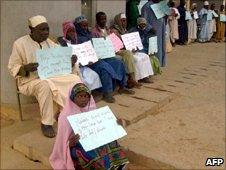US Supreme Court rejects Pfizer Nigeria lawsuit appeal
- Published

Pfizer has paid $75m to the Nigerian authorities to settle related claims
The US Supreme Court has given Nigerian families the green light to sue the drug company Pfizer over the use of a new antibiotic on their children.
It rejected the firm's appeal against a ruling allowing lawsuits to proceed.
The families say Pfizer did not get their proper consent to test the antibiotic Trovan on 200 sick children during a meningitis outbreak in 1996.
Eleven children died and others were blinded, paralysed or brain-damaged. Pfizer denies all allegations.
The company says the children who took the oral drug had a better survival rate than those who did not.
The meningitis epidemic killed 12,000 children in Nigeria over six months.
Banned
At the Supreme Court on Tuesday the justices dismissed, without comment, Pfizer's claim that the Nigerians could not sue under the Alien Tort Statute, which allows foreigners to seek compensation in US courts over violations of international law.
A federal judge initially said the cases should be heard in Nigeria, not the US, but this was overruled by the 2nd US Circuit Court of Appeals in New York.
The US government had urged the Supreme Court to reject Pfizer's appeal, saying the questions presented did not warrant review.
Pfizer said it was disappointed with the decision, but noted that it might win dismissal of the lawsuits on other grounds, including that Nigeria would be the appropriate place for the cases to be heard.
"The company looks forward to presenting its defences in court and remains confident it will ultimately prevail in these cases," it said.
Pfizer has separately paid $75m (£50m) to the Nigerian authorities to settle claims related to the incident, which occurred a year before Trovan was approved by the US Food and Drug Administration (FDA).
In 1998, the FDA approved Trovan for use by adults only. After the agency received reports of liver failure, its use was restricted to adult emergency care. The European Union banned its use in 1999.